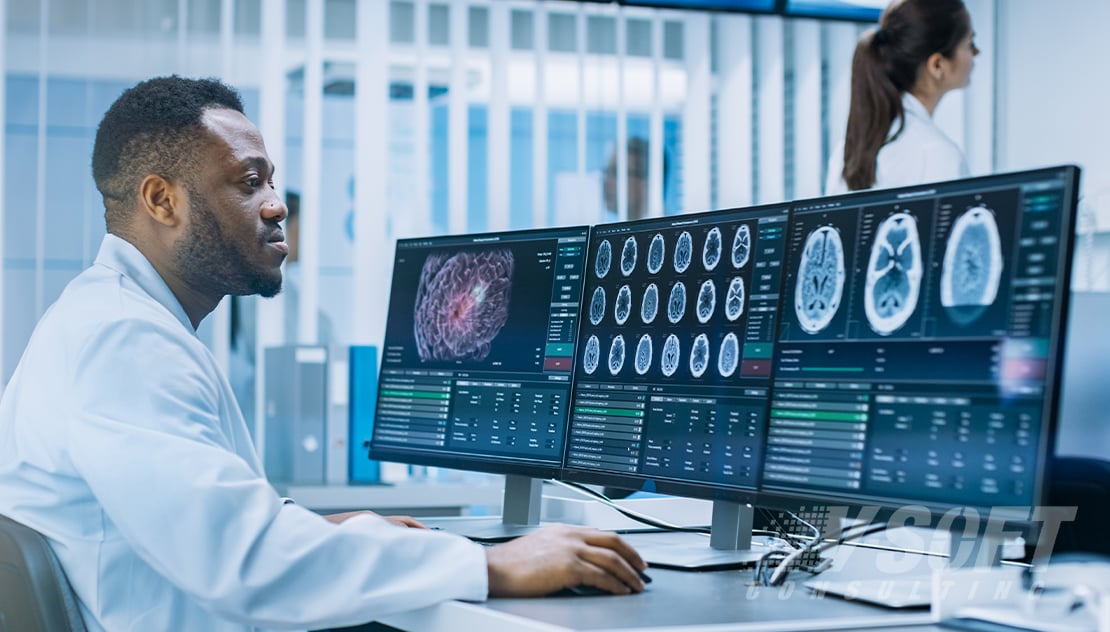From medical diagnostics to virtual health assistants to robot-assisted surgeries, artificial intelligence applications are in nearly every facet of healthcare. This trend is highly beneficial to patients, healthcare professionals and clinical researchers to improve efficiency and quality of care as well as helping healthcare professionals gain valuable insights.
Artificial intelligence has made groundbreaking innovations in discovering new ways to detect and treat diseases. For Machine-learning algorithms to make intelligent decisions, they require large amounts of healthcare data, however, the use of medical data without proper data security measures has been the biggest concern in the industry.
Why is Medical Data Security Important?
Medical data is highly personal and many aren't willing to share that data with anyone making medical data more sensitive. Patient data in healthcare includes a lot of personal and financial information such as an individual’s social security number, and payment details like, credit cards and insurance. It is for this reason that in the black market a single patient record can be sold at a price worth fifty times that of a credit card record. While a credit card record may include some financial information, a medical record is likely to include personal information such as birthdays, addresses, family members’ names which can be cross-referenced when committing financial fraud or identity theft.
Risks and Threats
The AI-enabled healthcare space deals with a huge amount of medical data which is considered as treasure trove by hackers and is frequently under cyberattacks. Since individuals from different departments might require access to electronic health records, they are mostly web-based making them vulnerable to these attacks. Additionally, the use of legacy software and outdated IT security policies can leave systems vulnerable to external attackers. External threats are not the only concern, sometimes negligent or untrained staff can cause a data breach unknowingly.
Data Sharing
With artificial intelligence in use, there are many scenarios where clinical data needs to be shared outside the institution it was collected in. In the case of certain diseases, there might be a need to consolidate data sets across multiple institutions to use their computing resources and algorithms for analyzing and gaining better insight. The clinical data may be shared with researchers in academia and the private sector to further transform healthcare or the development of better algorithms. Similarly, data can also be shared with pharmaceutical companies for the development of new drugs. This sharing of patient data for secondary purposes across institutions not only carries the risk of a data breach but also raises the question of consent and data privacy.
Laws and Regulations
Given the sensitive nature of patient data, different countries have different regulations over data security in the healthcare sector. In the United States, data security in healthcare is regulated by the Health Insurance Portability and Accountability Act (HIPAA). It is a federal law that standardizes data security measures required to be taken in the healthcare industry. HIPAA requires the de-identification of data by removing specific individual identifiers. Additionally, states and even institutions may come up with their own rules to ensure patient data security without causing roadblocks in research and the development of artificial algorithms dependent on medical data.
Ensuring Data Security
- Understanding the laws where the medical practice is located is important in not only avoiding penalties, but also ensuring patient data privacy. For instance, in the US when disclosure of protected health information is not permitted by the HIPAA it is necessary to obtain authorization from the patient.
- De-identifying data sets can go a long way to ensure data privacy as well as compliance with laws. HIPAA permits disclosure of de-identified data without any limitation.
- Artificial intelligence is not just for treatment and research but can also improve data security systems. Data protection and compliance controls can be built into the artificial intelligence model itself.
- Artificial intelligence algorithms can be trained to combat healthcare security challenges, such as detecting malware, identifying security breaches, protect from cyberattacks, and even prevent non-compliance with rules much more efficiently than traditional software.
- When integrating security layers in healthcare AI platforms, it's important to ensure they do not hinder healthcare professionals from their regular work. The trade-off between security and accessibility must be thoughtfully balanced in favor of efficiency.
Conclusion
AI is transforming healthcare and is likely to make more groundbreaking innovations in the future but concerns of data security of patients do hinder its pace. However, with adequate safeguards, measures, and compliances these concerns can be mitigated and AI-enabled healthcare continues its progression.
















